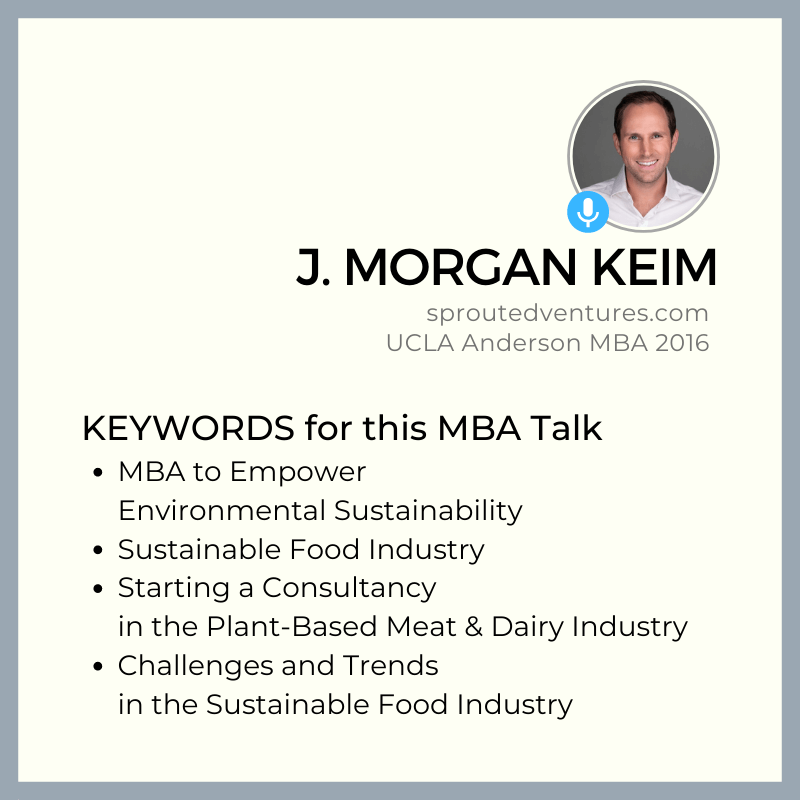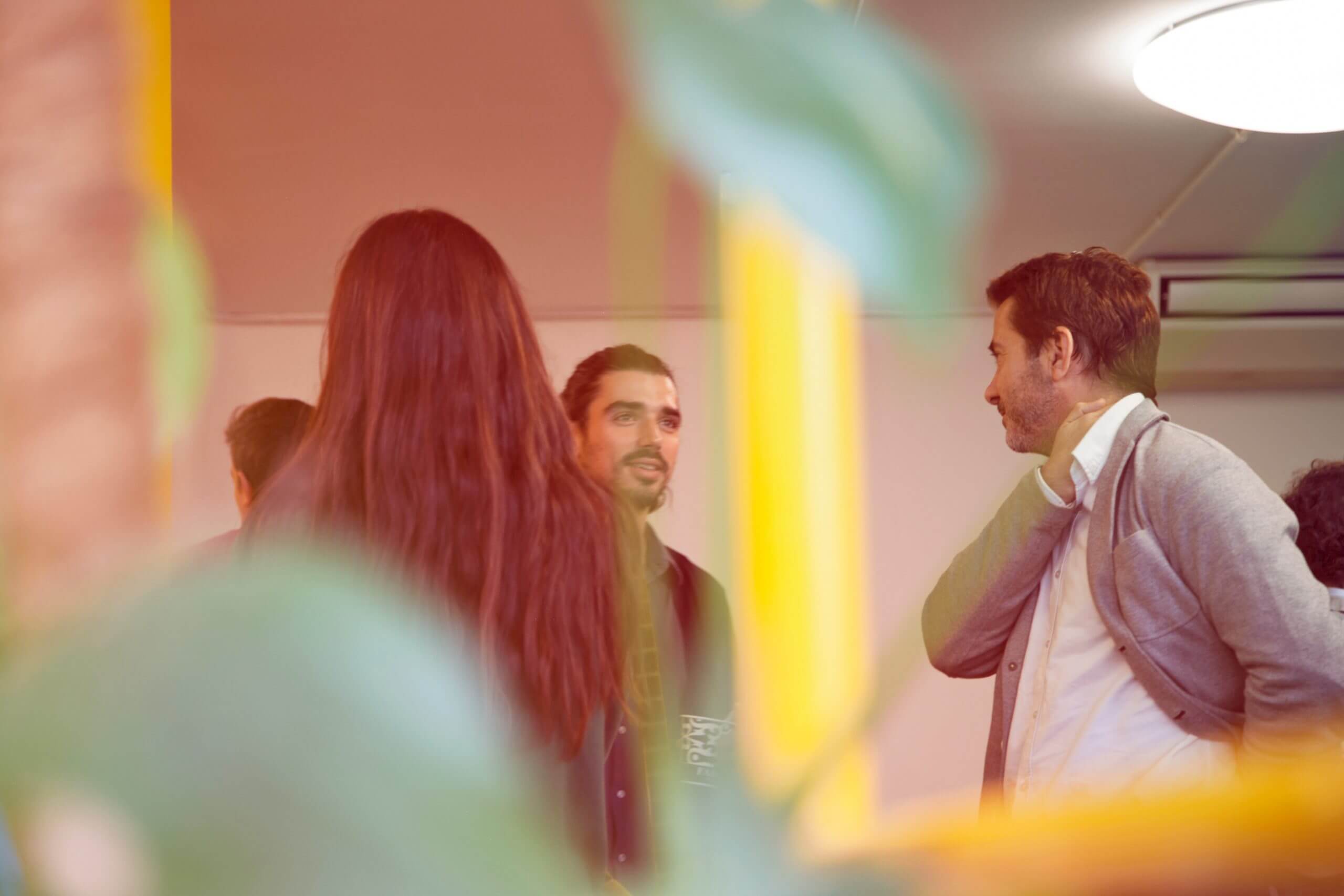Have you already tasted any of those burgers with plant-based meat?
I’m talking about Impossible Burger or Beyond Meat brands.
In this interview, we are joined by Jay Morgan Keim. He’s a UCLA Anderson graduate from 2016.
Morgan is the founder and CEO of Sprouted Ventures, a consulting agency focused on helping emerging food tech brands find funding, scale revenues and enter markets.
Keep reading to learn about this fascinating new food market. Read to get some of Morgan’s insider tips and warnings for new entrants. And see if you share Morgan’s approach to entrepreneurship as a way to spread sustainability in the industry.
[toc depth=”1″ title=”This Talk Content:” title_tag=”strong”]
Episode Notes
Morgan’s pre-MBA Experience in Digital Marketing
How do you present yourself?
[1:15] My name is Morgan Keim. I’m the CEO of Sprouted Ventures. An early-stage go-to-market strategy firm for plant-based meat & dairy based in Los Angeles, California. I actually live in Santa Monica by the beach. Been here for about 10 years, and originally grew up on the east coast. So I followed the sunshine basically to a warmer past two years out here.
What are your favorite resources for entrepreneurs?
[2:04] Yeah, I have several that I like to follow. My niche is in food entrepreneurship, specifically in marketing, sales and business development. So I find that the resources that most resonate with me are podcasts. Usually, I love the show How I Built This, the podcast. In terms of books, I like Zero to One a lot by Peter Teal.
Books for Consultants
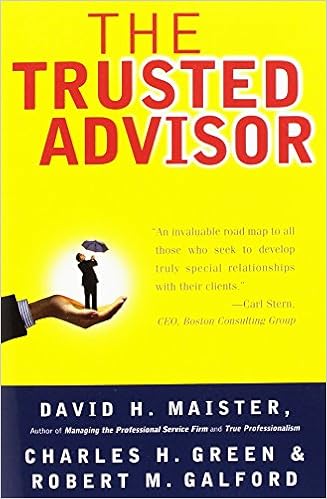

And given my day-to-day role, essentially, as a consultant. There are some great consulting resources for people who are trying to really script their own destiny as independent consultants. One of them is called the Trusted Advisor that helped me out a lot. Another one is a book is called Let’s Get Real or Let’s Not Play.
Both of those have been pretty incremental in understanding how to bring value to clients. And especially for how difficult independent consulting can really be. Because you have to make your own relationships. You have to close your own clients. You’re never guaranteed that you’re going to get payment from anybody.
You know, so very much it’s about finding ways to efficiently and effectively create value for other people. Which isn’t necessarily always taught in the MBA curriculum. I turned to lots of different outside sources to help understand other ways of creating value.
Weren’t you always an independent consultant?
[3:49] No. My background is in digital marketing. And I’ve also created various ventures since before my MBA. The first company that I created was right out of college. I’ve really wanted to align with my values around health and sustainability. And so, I created a consultancy, helping basically digitize, messaging and helping to do digital marketing for companies across a wide range of sustainability industries. So this was everything from solar and wind, cleantech projects, to consumer goods that were better for the planet.
That kept in mind. This was in the late 2000s. So it was a lot more novel of a concept. But I realized that ultimately they needed to follow the path, and get a bigger and better experience before I could really serve the highest degree of clients and bring the highest degree of value. This is what brought me into digital marketing, and working specifically ads agencies out on the West Coast with clients like Honda, Acura, and Game of Thrones or HBO.
Doing an MBA to Empower Environmental Sustainability
Why do you choose to do an MBA at that point?
[5:32] I’ve always known that I wanted my career to be in using business and market-driven forces, to empower sustainability to progress, environmental sustainability. I wanted my career to be in using business and market-driven forces to empower sustainability to progress, environmental sustainability. For me, that was why I went back to get my MBA.
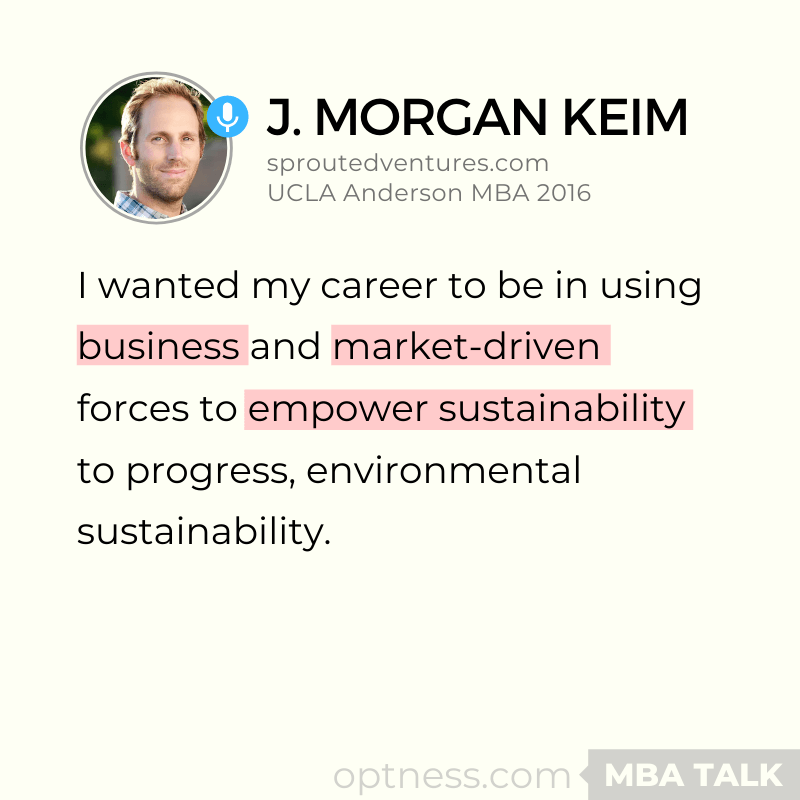
For me, that was why I went back to get my MBA. Ultimately, I had a great experience from my marketing roles, and I was very good at what I did. Yet I didn’t understand how to have that holistic picture of really evaluating business opportunities outside of my realm of expertise. I also didn’t have a strong network outside of marketing and advertising.
So one of the big benefits for me going to get an MBA was in being able to network and align with different people, who we’re working within sustainability and social responsibility, through the UCLA Anderson network. What I took for me though, was to ultimately focus and decide what within sustainability I really want to focus on. And that’s how I ended up narrowing in on food, which is my current industry and has been for many years.
And realizing that to tackle the problem of really bringing better forces, better products that are more environmentally sustainable, it’s too broad to just say you can do that. And so a little bit of specialization can really help to maximize your impact.
So I picked what was one of the most environmentally, degrading industries, which is animal-based farming. It takes 1500 gallons of water to make one pound of beef. That’s 30 days of your showers, to have a couple of burgers.
When you look at stats like that, it’s almost hard to believe. And so when I think from my entrepreneurial lens, about solving problems.
I don’t want to solve a problem that many people are out there trying to solve. I want to solve the biggest problem I can think of. To me right now, that’s the biggest problem I can think of.
And going 10 times bigger or 100 times bigger is not 10 times harder or 100 times harder.
Going 10 times bigger is not 10 times harder. Why it is not?
[8:10] So if you look at a commodity. if you want to bring a commodity to market. It’s no different than anything else. You’re going to have so much competition. That it’s going to be hard for you to stand out.
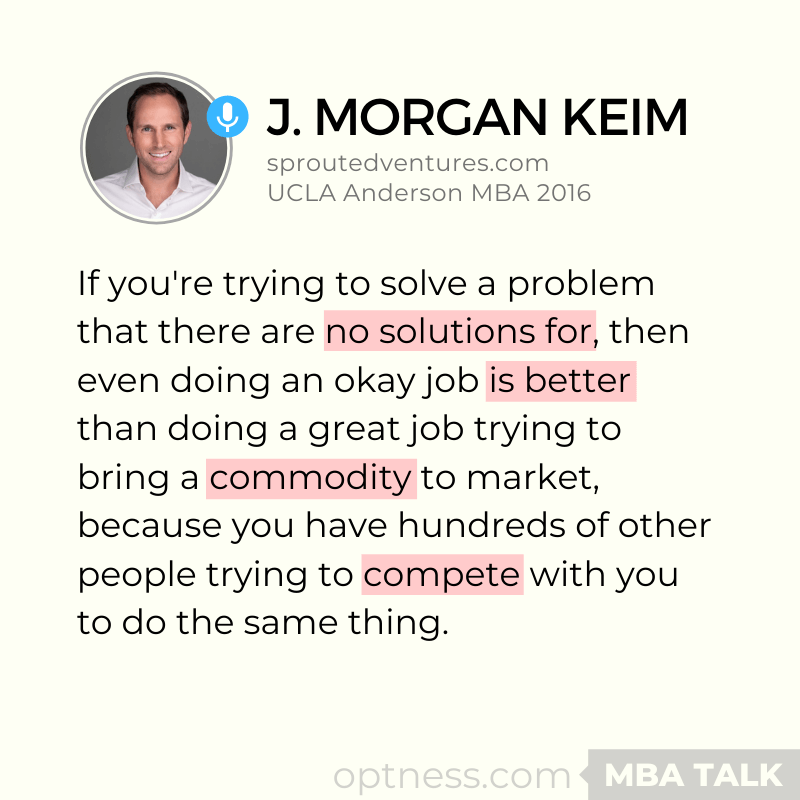
If you’re trying to solve a problem, that there are no solutions for or at least not any good ones. Then by focusing even doing an okay job, has something that solves a major problem that doesn’t have any solutions. It is better than doing a great job trying to bring a commodity to market. Because you have hundreds of other people trying to compete with you to do the same thing.
So even if it’s different. Even if your path, whether you focus on problem-solving, even if you’re focused on a problem that is exponential massive like environmental sustainability, or removing animals from the supply chain, which is in my case, you still have less competition because you don’t have as many people thinking that big.
You do have a lot of people saying: “I want to bring the next app to market or the next salty snack to market.” And that’s what they know. And that’s fine. A lot of people will stick to what they know. But by being deliberate, and focusing on creating exponential value, in my experience, I haven’t found it to be exponentially harder. Business is hard, plain and simple. But it’s not exponentially harder if you go exponentially bigger.
What other opportunities do you see for startups in the sustainable food industry?
[10:11] Well, from a high level, just looking at what are the biggest problems. Those are our greatest opportunities. If you can solve a problem that 1 billion people will pay you $1 to solve. You’re a billionaire. So, when you can slow that down looking at sustainability, our energy system is screwed up. Our food system and agriculture system is screwed up. Our fashion is extremely polluting. Yet there is a new class of evolved consumer that puts a value on transparent and sustainable companies.
So by being open in your business practice trying to make things better than what exists, that is more sustainable. That is better for animals. That is better for the planet. Then you’ve already helped to differentiate yourself from the competition because you’ve created superior value for your consumer. And that’s the value that they will pay for.
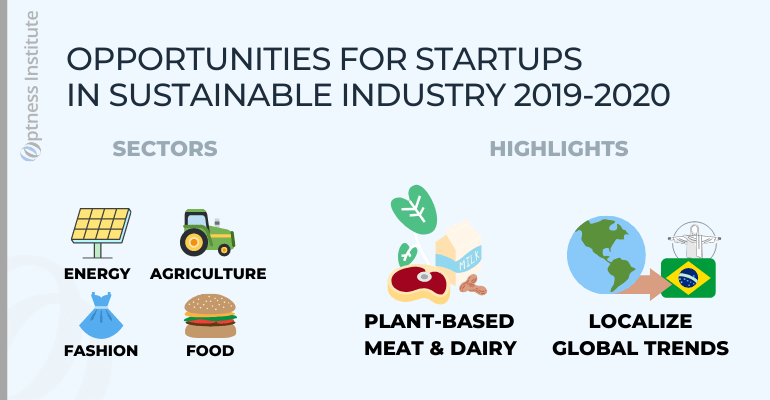
When it comes to my specific industry, we’re seeing unparalleled growth in plant-based meat & plant-based dairy. Right now, it’s like consumers have all of a sudden woken up. And they’ve seen that they can have milk. Or they can have an Impossible Burger or a Beyond Burger, a plant-based meat burger that tastes, looks and feels just like it’s the animal-based counterpart. But it has no animal in it whatsoever. It’s made 100% of plants.
So my focus right now, the opportunity that I’m after and what I do on behalf of all of the clients that my group Sprouted Ventures work with, is helping to position plant-based foods. Different vegan foods for consumers like you and me. Who maybe eat a little meat or drink a little milk, or whatever animal products we might consume. Making it normal for those consumers to have these options readily available at a restaurant near them. Or at a grocery store near them, and ultimately creating that consumer demands.
Are you vegan or vegetarian?
[12:40] I am 95% plant-based. The only time I won’t eat plants is when I’m traveling. And there’s nothing else on the menu that is healthy and nutritious.
Our generation is much more aware of the food and where it comes from and the impact it has on the environment. Right?
[13:05] Well, and you’re especially in an interesting market on the day. Because in Brazil, there are 16 million consumers that identify as being plant-based. Yet, you know firsthand about the lack of options, right? That’s a huge growth market with latent consumer demand where very few entrepreneurs have brought anything to market yet.
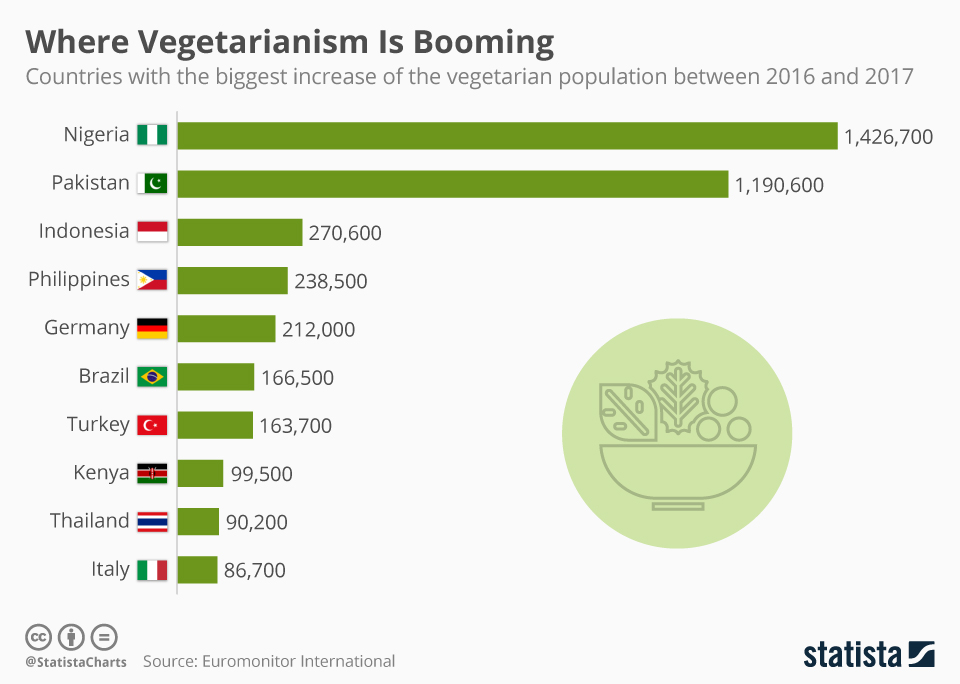 You will find more infographics at Statista
You will find more infographics at StatistaThe first few companies to do that, and to do it well will have handsome market growth. Because they’ll simply be the first to market. That’s how you can beat the competition out is by leading the demand of what’s working in other places, bringing it to your localized market with localized knowledge. That’s another tremendous opportunity in this space.
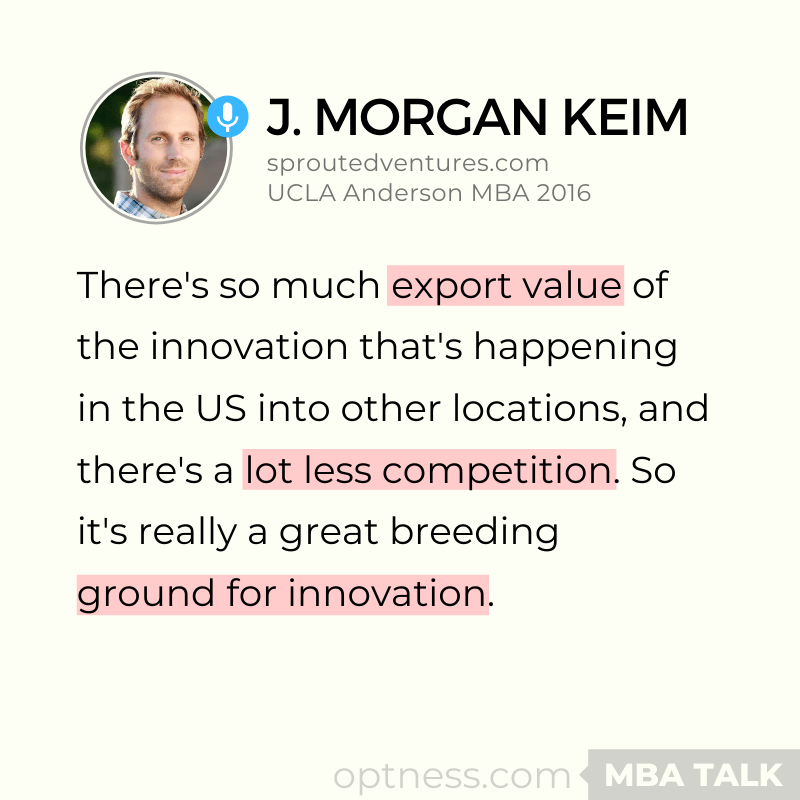
That’s great advice for MBAs that want to get into entrepreneurship.
[14:00] Oh, absolutely. And frankly, with so many international MBAs, there’s such a value to the lens that they carry from their region. America is not the center of the universe as much as people may believe that in the States. There’s so much export value of the innovation that’s happening here into other locations, and there’s a lot less competition. So it’s really a great breeding ground for innovation.
Resources for Aspiring Entrepreneurs at UCLA Anderson
Did you know already you wanted to become an entrepreneur back in school?
Getting back from MBA to the school, did you know already you wanted to become an entrepreneur back in school? Have you followed any entrepreneurship course or were you involved in clubs?
[14:47] All of the above. I knew that I wanted to be an entrepreneur and focus on this full time. But I didn’t have the confidence to do it for a long period of time as my only source of income, prior to getting my MBA. I educated myself on the risks of the entrepreneurial mindset. And ultimately what I was going to be getting into, by being a part of the UCLA Entrepreneur Association.
By also being a part of the Net Impact the social impact club there. But also by starting my own club. I helped to start a separate club within our 360 person MBA cohort. Where we would have one person, usually somebody International, cook many dishes from their home country. Host a group of 12 to 15 people in their homes. And it became a weekly social event for my section. It gained a lot of population we had about 20 of these dinners. And it was so popular that it spread to other sections to the point when, I think, they still do this in the program.
So by creating the entrepreneurial roadmap within the business school I actually gained confidence in what I do today. Additionally, classes really helped. There was one in particular from a teacher called Derek Alderton, who taught an Entrepreneur Venture Initiation course. And it’s one of those courses where if you’re not fully prepared you’ll get called on for something, and your heart will skip a beat. He’s not an easy grader. He’s not an easy teacher. But it’s just the kind of course that will make you really realize the risks and the drive that it takes to be an entrepreneur outside of the MBA classroom.
Do you remember any special dish a colleague did for you?
Well, two points first, I’m half Italian. I lived in Italy and because of that, I became a foodie. You know, I envy you about starting up this club. Do you remember any special dish a colleague did for you?
[17:18] One of my favorites was from a Korean classmate who made it. I don’t even remember what they were called. It was just a full spread of just about everything you could find in a Korean market. That was a pretty interesting one.
We had a vegetarian Brazilian meal, where I believe she made those “feijoadas”. It was really really good. And trying to remember what else, one of our Japanese classmates made a full spread of sushi for one of these. Ultimately was all about sharing in international flavors.
What about the professor’s Derek Alderton course?
[18:26] The class was called Entrepreneurship and Venture Initiation, or EVI. We would have cases, and, essentially, we would have to put ourselves in-between roles of being either: the entrepreneur, who was pitching; venture capitalists; or pitching business channels to try to close a deal. Or we would actually have to pretend to be the venture capitalists and assess deals.
Like for instance, I remember my favorite one, we dissected the Zipcar startup case. We had to pretend to be the venture capitalist. And so we would review the Zipcar case. And then present to the board of the fictitious venture capital company where we worked. Whether or not we would invest in this.
Unanimously, the class voted not to invest in the company, as the financials weren’t good. There were growth concerns. There were operational concerns. I mean, it was like everything that seemed like it could have gone wrong, had gone wrong at that company. And yet, now we know it as a successful startup.
And so it really teaches you. That there are lots of ways to look at creative problem-solving. But by putting yourself in another person’s shoes, by your key stakeholder, your key customer’s shoes, it can really help you see a different perspective that maybe you didn’t see before.
Gaining Experience in the Sustainable Food Industry from the Inside.
You knew you wanted to be an entrepreneur, but after the MBA, you went to work for a company. Why?
[20:16] Yeah. I had an internship during the MBA at a company called Impossible Foods. And this is now emerged to be a large plant-based meat food tech company. With, I believe, over $400 million dollars in venture capital money. But at the time, it was pretty much unheard of when I joined the company to help them with their growth and marketing.
And that experience led me to realize that if I want to make a shift into food from digital marketing I needed to learn more about that industry, and to really understand how decisions get made, how products get made, and that sort of thing.
So, after Anderson, I worked for about one year at a company that was well established in the industry. Yet it allowed me to be the marketing director of several different product lines, to better understand how the forces work in food. And how I could make a difference as an entrepreneur when I did decide to spin out my company.
What are the differences in this industry compared with your previous experience?
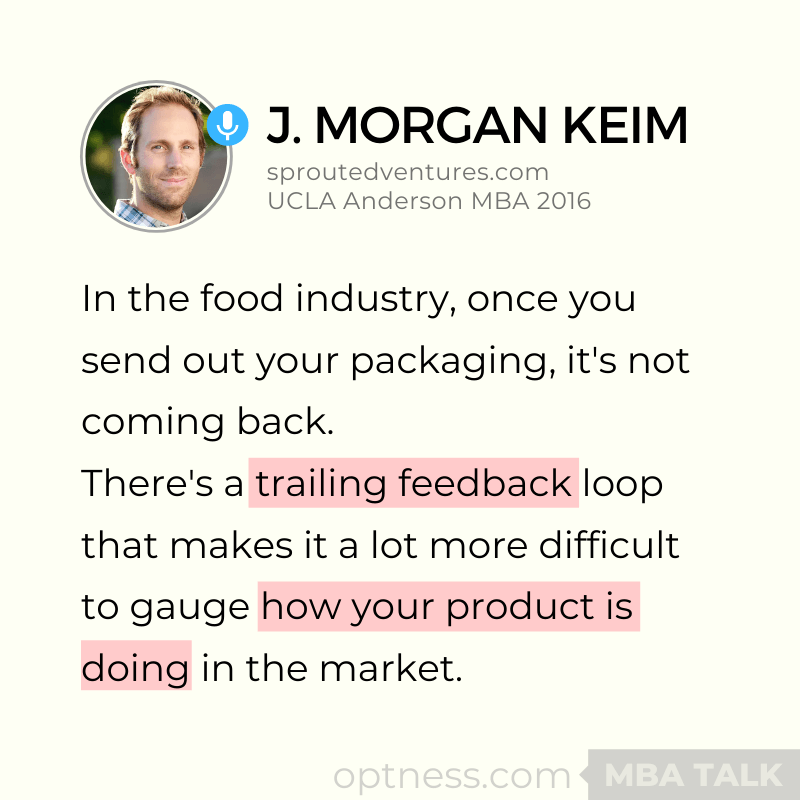
[21:37] You know, it’s an interesting question. My previous experiences, in digital marketing, were such that I would work with clients and companies to help them launch digital experiences. Which can be changed at any time. They are online, we can take them down if we need to.
In the food industry, once you send out your packaging, once you send out your product unless you issue a recall, it’s not coming back. So there’s a trailing feedback loop, and a trailing set of customer understanding that makes it a lot more difficult to gauge how your product is doing in the market, what people really think, that sort of thing. And also just simply working in material goods, as opposed to digital marketing, has its own set of inherent differences in the tangibility of products.
Starting a Consultancy in the Plant-Based Meat & Dairy Industry
After working for Natierra you still wanted to build your company?
[22:59] Ultimately my heart was set on staying in the plant-based meat & dairy industry and driving the growth within this industry. As I mentioned, that’s the single biggest source of environmental impact I’ve identified for myself. And by starting my company Sprouted Ventures. This gave me the ability to work with several different clients. And maximize the amount of impact I could have on the environmental legacy that I care so much about.
How does the business model works?
[23:35] We embed as members of an early startup team for existing food tech startups. And we help them to build, launch and scale their brands. Some of these companies are just getting started. So we’ll help them figure out their product-market fit, set up their marketing, sales and fundraising plans. And then guide them through the execution of those plans.
Whereas other companies are in the market already selling. And we will help them turn on the jet boosters, and rapidly scale and accelerate their revenues. We will work with companies up to about $10 million in sales. And ultimately, helping them tap into the mainstream consumer market for their vegan products.
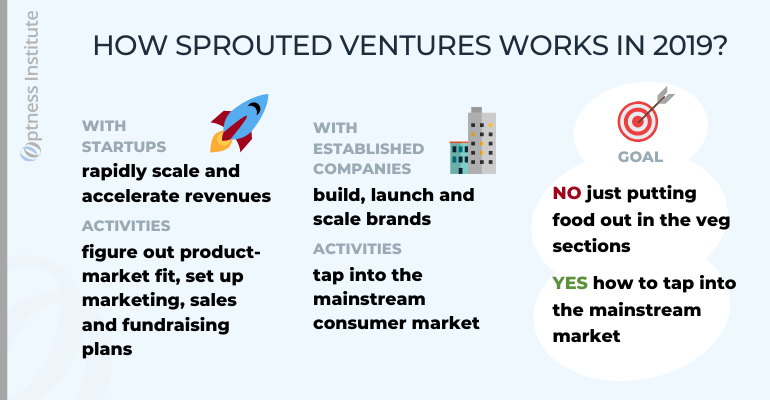
So rather than just putting food out in the sections –like the frozen section where vegans and vegetarians might shop– we specialize in figuring out how to tap into the mainstream market, and position products for meat & dairy consumers. That gives better environmental, animal welfare, and health benefits to those consumers.
How you’ve got your first customer?
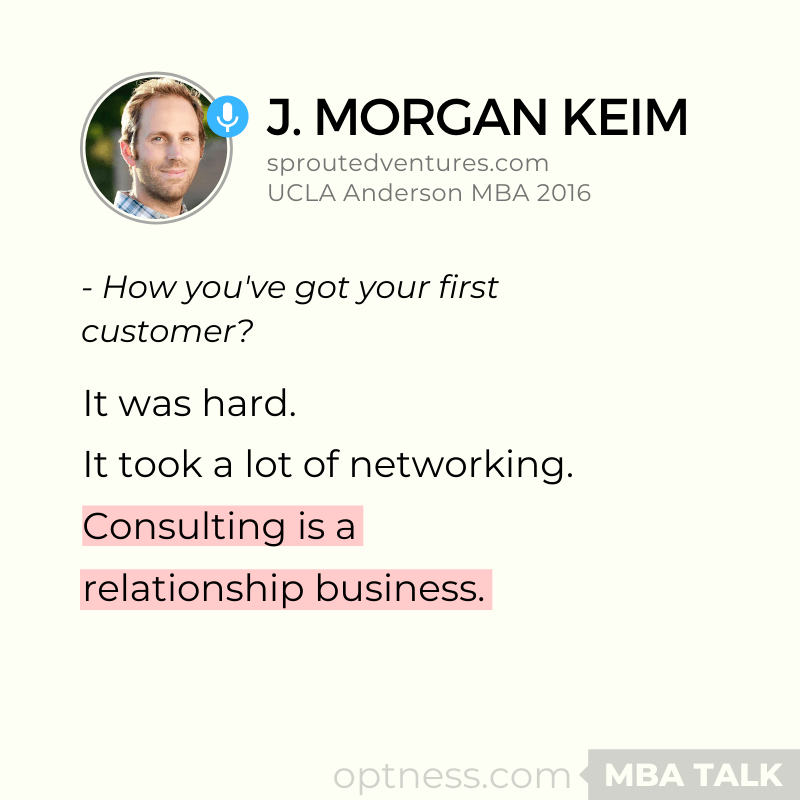
[25:01] It was hard. It took a lot of networking. Consulting is a relationship business. And when you’re just starting out, you’re relatively new in building relationships, unless you’ve worked in the industry for many years.
When I just started, I had about two years of experience in the industry. So it was not a whole lot. For me, I had to make a large upfront capital investment in myself, which felt very uncomfortable. I am conditioned as an MBA to think in terms of ROI (Return of Investments), you spend X amount and you get Y amount. And hopefully, that Y amount is far greater than X.
Yet when it came to spending money on myself, to go through personal consulting training, to buy a conference ticket at $2,000 a pop, to get onto a flight and fly to New York, for a cold intro meeting with a buyer at Whole Foods.
Those kinds of things were hurdles that I had to face when I was first starting my journey. But ultimately helped me to develop relationships and the network that I have today. That guides our growth.
(Andrés) That’s touching myself because I’m facing it as well as an early partner of Optness. I need to network. I feel the need to network as well. And sometimes it’s difficult to make these decisions to invest in ourselves because we are new to this and it’s difficult: you don’t have the experience, right? You never did this before or maybe you did, but it was not intentional. And you don’t know if the money will come back eventually. Right?
[26:54] Exactly. It’s a total blind leap of faith. And you just have to hope that you’re putting your best foot forward. And taking imperfect action can ultimately teach you the lessons you need to learn. Through successes or usually failures. Ultimately going to those next levels of growth in your entrepreneurial journey.
The Benefits of an MBA for an Entrepreneur in the Food Industry
If you had a chance to go back, would you have done the MBA again?
[27:27] Absolutely. It was one of the best experiences I’ve ever had in my life.
What do you think about those people that say that business school is a waste of money for entrepreneurs?
[27:42] Business school is what you make it. I find that I rely on the UCLA Anderson network for so much of my success in my day-to-day roles. For instance, I reached out to the alumni database two days ago to send an email for a client’s project that I’m working on.
And more than a dozen alumni who work in that specific industry volunteered themselves to speak with me so that I can learn more about it. The mantra of UCLA Anderson is shared success. And it couldn’t be truer in how that effect comes back today. So in my own entrepreneurial journey I need collaborative people around to help me. And I offer myself to the network for anything that it might need.
For people who say Business School maybe isn’t worth it for an entrepreneur, I trust that they have a very different lens on how they do business. But for me, I focus on business as being people first. And given my business school network, I couldn’t think of a better competitive advantage or a better benefit in the marketplace than my business school experience.
Challenges and Trends in the Sustainable Food Industry
What are the major challenges in the sustainable food industry?
[29:37] Yeah, a part of our focus is eliminating risk. The other part is maximizing the upside game. There are always issues pertaining to food safety. What if somebody gets sick? They could sue your entire company.
There are issues that have to do with competition, obviously. Some food products are not the hardest things in the world to start. So it comes back to that thing I said about going 10x bigger or 100x bigger. If you’re starting a food company and you have a new salty snack, you have to compete with so many other salty snacks. That’s nothing but risk.
Even if you just start a new food company, and you have an entirely new ingredient that you sourced from some random part of the globe, the minute your company becomes successful or shows that people like your ingredient, other people will go and copy that. And then you have to play defense all the time.
So those are huge risks and having to fight off the constant threat of competition. At the same time, you can insulate against those risks, and focus on protecting your brand’s. Embedding some sort of IP, intellectual property or other sorts of trade secrets, and defensibility within your brand’s fabric, to decrease the chance that you can get copied easily. But it’s a very competitive industry regardless.
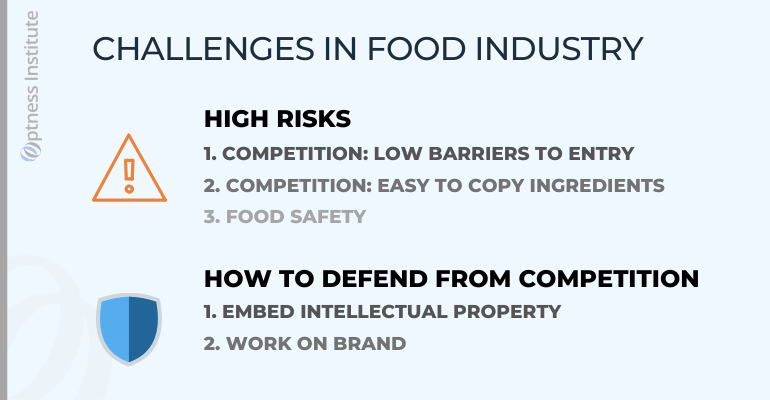
What are the current trends in the food industry?
[31:40] Yeah, at the Natural Products Expo West in Anaheim, California. And there’s a major shift happening in the industry. It’s driven by consumers. And when we look at natural products in general, people want cleaner and healthier products.
They want less sugar. They want less salt in their products. And then there are lots of dietary trends happening. Paleo & Keto are very much alive. CBD (cannabidiol) is finding its way into just about everything, here in the States.
And that trend was very apparent within my space for plant-based meat & plant-based dairy. We saw lots of brands making their products healthier. So rather than just being something plant-based milk that replicates dairy, mouthfeel, the texture, the taste. Companies are now starting to focus on the nutritional components of dairy. And actually ensuring that there is enough protein and other things like that.
But overall, even just for natural products entrepreneurs in general. There’s never been a better time to be in the industry. Don’t let all the competition fool you. The growth is there for niches. And you know the saying that the niches are the riches. So really focusing on things, on products that deliver unparalleled value. That does not yet exist in the market. That seems to be the winning formula to unlock venture capital, and distribution, and sales from large companies.
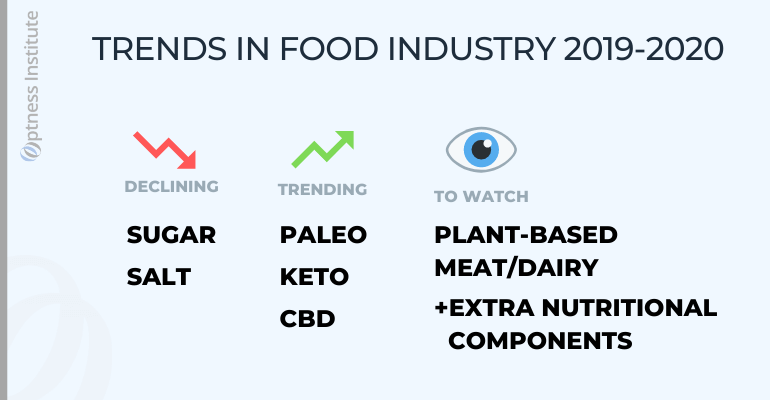
Any parting thoughts now for aspiring entrepreneurs?
[33:29] Yeah, my only thoughts to share it’s like a Nike slogan, just do it. So many people talk about entrepreneurship, and never do a thing about it. And I honestly think that one of the worst things you can do is take a class on entrepreneurship, and think you are an entrepreneur.
Because it’s so different. Those classes can teach you some of the skills that you might rely on. But at the end of the day being an entrepreneur comes down to persistence, passion, and the ability to constantly act. To constantly do, to constantly try, and to learn from what happens.
Even when most of those things, most of those results that you get might be failures, are not what you’re expecting. It is singularly the only way to grow a company is by doing and by trying. So when people talk about wanting to do entrepreneurship. It carries a totally different way than the people who actually jump in headfirst and say: “Look. I’m actually going to try to do this. I’m going to give it my all.”
And that’s what you’re experiencing Andrés. Like this is it. You’re living in the thick of this. You know that this is important. And even if you’re trying to work on your model for the Optness Institute. Or figuring out what your focus is. Or figuring out how you’re going to monetize it. There’s no way you can do this without trying.
So that’s the part that matters. But you’ll figure it out. If you keep trying. You’ll learn if you keep trying. So people that talk about it that don’t try. That’s where you lose the entrepreneurial ability and nothing actually happens.
—
This interview was very inspiring and it was very interesting as well. There are a lot of things going on in the tech food industry. Thank you for joining for this episode of the MBA talks, a podcast brought to you by Optness Institute. You can find all Notes of the other episodes, as well as SUBSCRIBE for future episodes@optness.com/mbatalk. And if you’re enjoying the materials and have any comments, topics, or suggestions, I’d love you to shoot me an email. My name is Andres and you can write to me at mbatalk@optness.com. Also, if you want to talk to Morgan Keim, you can find him on LinkedIn and or email. With that, thank you, and I will see you in the next episode!

